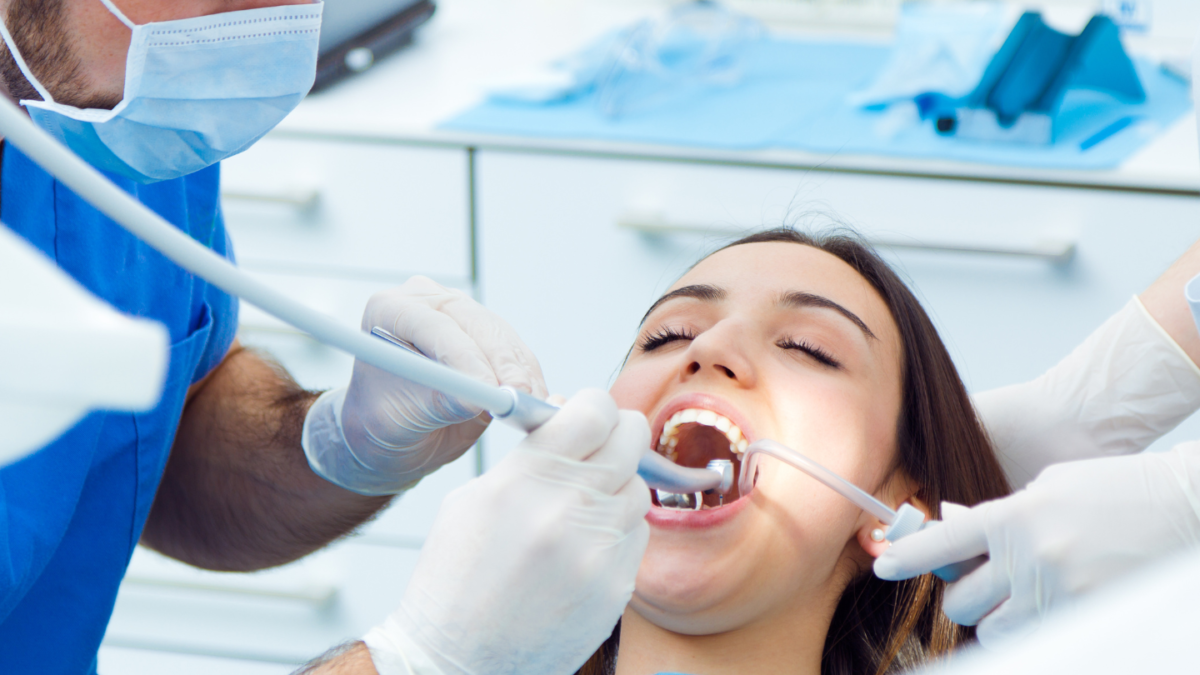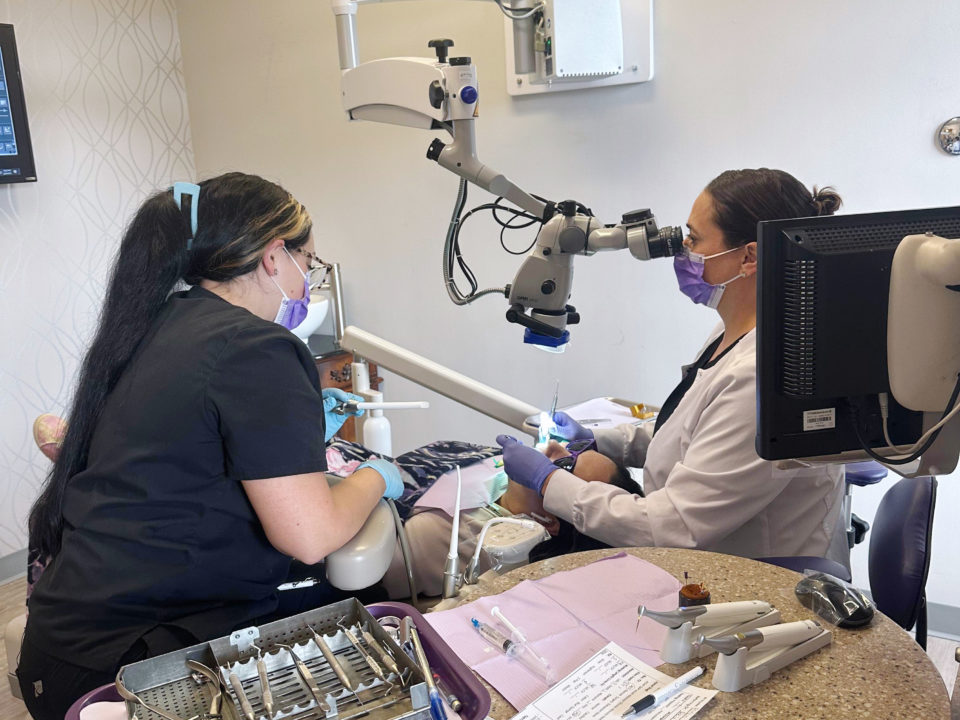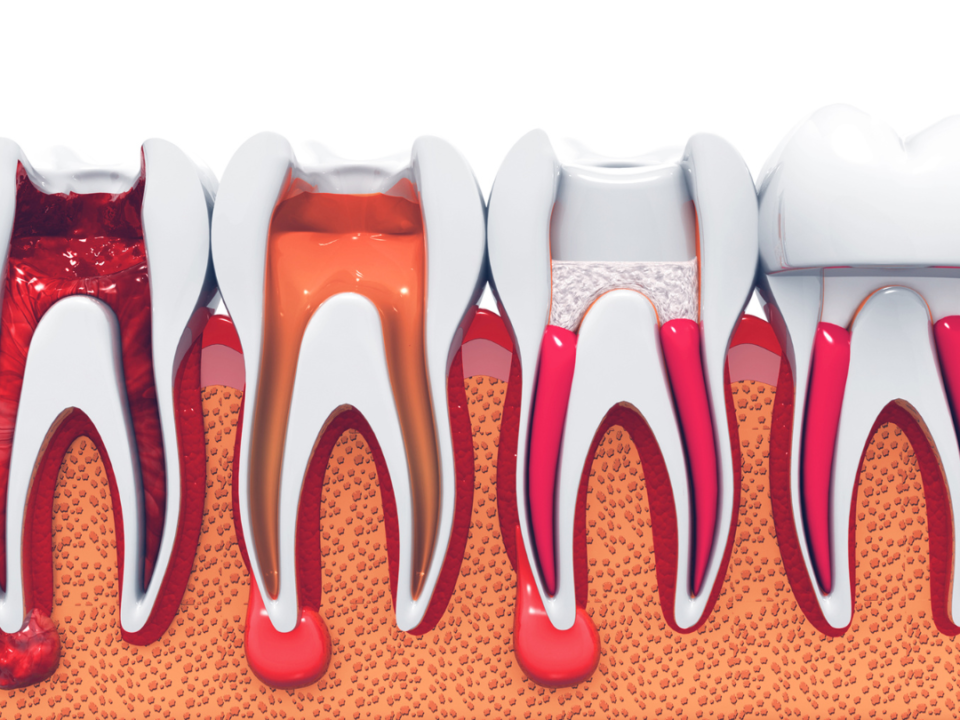
What are the Benefits of Root Canal vs Extraction
June 27, 2023
Can a Root Canal Get Infected?
July 16, 2023
What are the Benefits of Root Canal vs Extraction
June 27, 2023
Can a Root Canal Get Infected?
July 16, 2023Healing after a root canal takes some time, but you can do some things to speed up the process and make yourself more comfortable. Find out what to expect and how to ease discomfort after your root canal.
What Happens During a Root Canal
A root canal acts as a means of stopping an infection. When you feel pain in a tooth that needs a root canal, it indicates that your tooth has inflammation inside it due to the bacteria in the tooth.
Prompt treatment is essential. Without getting a root canal, a cavity can extend to render the tooth not savable, and can also cause severe infection.
Endodontists treat these infections with root canals to save the tooth and allow you to avoid the need for dentures, implants, or bridges to replace extracted teeth.
During the procedure, the endodontist will take the infected pulp out of the tooth. This process stops the infection source, which saves the tooth from irrevocable damage. Yes, the process removes nerves from the tooth, but according to the American Board of Endodontists, your fully grown teeth don’t require the nerves for functioning. Once the endodontist cleans out the canals, they fill the empty spaces in the root canals with gutta-percha and add a filling to seal off the tooth. You may need a crown to protect a back tooth.
During the healing process, the body recovers from the infection, and you’ll quickly begin to feel a reduction in the discomfort you had before the procedure.
How Long for a Root Canal to Heal?
Often, people who have root canal therapy feel better in a week. Some people have lingering sensitivity for a few weeks after the process, but it is much more bearable than dental pain before the procedure.
What You Can Do the Day of the Root Canal
Immediately after the root canal, you may have continued numbness in your mouth from the anesthesia. However, because the endodontist uses a local numbing agent instead of general anesthesia, you can return to school, work, or other activities immediately after the procedure.
One word of caution, avoid eating or chewing on anything while your mouth remains numb. You could accidentally bite your tongue or cheek and cause more serious damage than you would realize. Once the sensation comes back to your mouth, you can safely eat and drink again. If you need to get a crown, avoid chewing on the site of the treated tooth until you finish that step.
What You Can Do in the Days Following the Procedure
Initial discomfort may begin once the anesthesia wears off. People have varying levels of discomfort, but most people can stand the post-procedure discomfort after a root canal.
To reduce pain, take 600 mg of ibuprofen every six hours on the clock. Don’t wait until you feel pressure, or discomfort. Taking ibuprofen four times a day for the first two days helps to prevent discomfort.
Some people find the need for extra pain relief. They can add 500 mg of acetaminophen with their ibuprofen doses. A little coffee or chocolate with medicine provides caffeine that boosts the speed of relief for the drugs.
After a couple of days, you should begin to notice a significant decrease in your discomfort. Expect some sensitivity for a week or more after the discomfort ends, but you should feel much better than you did before the root canal.
How Your Actions Affect Potential Complications
What you do after getting a root canal can increase or decrease your chances of failure of the root canal. Complications can occur when you don’t follow your endodontist’s recommendations or take too many risks after the root canal. Check out the following for what to avoid and things to do after your root canal to reduce the risk of problems.
Actions That Can Increase Your Risk of Harm
Following your root canal, avoid using tobacco products, which can hamper healing. Dental professionals discourage all tobacco use because it can raise cancer risks, cause tooth staining, and reduce healing times after dental procedures.
Secondly, if you need a crown on the tooth, don’t chew on that side of your mouth until you get the final crown placed. A crown protects the tooth, but you risk cracking the tooth if you bite down on something hard before you get a crown. If you fracture the tooth before or after the crown placement, you may need to go back to your endodontist for retreatment of the tooth.
Finally, don’t skip any follow-up visits that your endodontist requests.
Things That Help You Feel Better
To feel better after a root canal, do the following:
- Take over-the-counter pain relieving medicine on the clock for two days.
- Avoid chewing hard or crunchy foods with the treated tooth.
- Brush and floss around the tooth normally to prevent cavities.
- See your dentist for a crown within two weeks if requested.
- Ask your endodontist any questions about healing and the root canal process.
With good aftercare, you can reduce your risk of complications and feel better in about a week.
Warning Signs to Watch Out for During Root Canal Healing
Infections are rare after root canals, but you may still develop one. After your root canal, watch out for signs of problems and call your endodontist if you experience one or more of the following:
- Severe discomfort or pain that worsens
- Swollen gums or a pimple on the gums
- Discharge or pus from the tooth
Complications can happen for a variety of reasons, and a failed root canal can cost you the tooth if you don’t have it treated. Do not hesitate to contact your endodontist if you have any of the above problems.
Come See Us at Innovative Endodontics, Where We Daily Change the Way People Think About Root Canals
The best way to make the healing process after a root canal easier is by finding a trusted endodontist to perform the procedure and ensure your comfort during the root canal. At Innovative Endodontics, we use tools and pleasant chairside manners to make you feel at ease during these painless procedures. Feel free to connect with us if you need a root canal or have questions about your healing.




